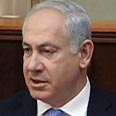However, he added, "There are conditions for this. Negotiations must take place without preconditions that mean huge concessions on Israel's part ahead of time. Also, the accord must finally be accompanied by security agreements in order to last for generations."
The prime minister also presented to the Cabinet his plan to limit dependence on oil. "Certain countries which control oil support terror," he said.
"This is a global problem that requires international effort. I spoke of this with German Chancellor Angela Merkel, Italian Prime Minister Silvio Berlusconi, the Polish prime minister, and others, and they have expressed interest in this issue."
However the prime minister said the plan would span over many years. "This is an effort that will not bear fruit within the next two or three years, but within a decade we may reach a solution, for example on the issue of dependence on oil for transportation."
On the issue of Syria, Lieberman was criticized over the weekend by many officials from both sides of the political spectrum.
"The foreign minister is busy with internal politics rather than diplomacy," Minorities Minister Avishay Braverman (Labor) told a cultural forum in Ramat Hasharon on Saturday.
"Given Israel's sensitive position in the international community, we are in need of diplomacy and a responsible and prudent foreign policy, not a policy that is driven by domestic political considerations," said Braverman.
The criticism also came from abroad, with official French sources describing the war of words between Israel and Syria as a "soap bubble".
They added that Lieberman's threats, directed at the regime in Damascus, do not reflect Israel's military or political strategy, the London-based Al-Sharq al-Awsat reported, quoting one of the sources as saying that Lieberman was "hot-tempered".
















